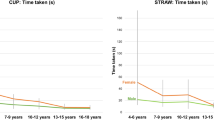Abstract
Individuals with neurodisability and dysphagia often aspirate food because of oropharyngeal impairments and poor control of respiration. This study explored the interaction between these factors in 32 participants aged 3–33 years. Each person underwent a modified barium swallow study, during which respiration was recorded and displayed simultaneously on the video screen, in terms of inspiration, expiration, and velocity of airflow (TV data). The duration of time that material remained in the pharynx before the swallow (either because of pharyngeal delay or residue from the previous swallow) was called the pharyngeal dwell time (PDT). The mean PDT of the 5 slowest swallows for each participant was calculated for both liquids and thick purees. The proportions of time spent in inspiration and expiration during the PDT in seconds and a score representing the abnormality of inspiration, including its frequency and velocity, were recorded. The volume of material in the pharynx prior to these swallows was also estimated. Twelve participants aspirated liquids and 3 of the 12 also aspirated thick purees. PDTs were longer among aspirators (6.2 s) than nonaspirators (2.4 s) when consuming liquids. Also, the percentage of the PDT spent in inspiration was greater among aspirators than nonaspirators when taking liquids (31% vs. 11%) or thick purees (35% vs. 14%). During the PDT, aspirators showed more abnormal respiratory patterns for liquids but not for purees. There were no differences in the volumes of liquid or puree in the pharynx before the swallow between aspirators and nonaspirators. A plot of the PDT against a combined respiratory impairment score (i.e., percentage of the PDT spent in inspiration and respiratory abnormality) predicted aspirators with a sensitivity of 83% and specificity of 95%. Aspiration results from oropharyngeal impairments with inadequate respiratory integration. Further research is needed to investigate whether intervention to improve respiratory control can reduce aspiration in people with dysphagia.
Similar content being viewed by others
Author information
Authors and Affiliations
Rights and permissions
About this article
Cite this article
Morton, R., Minford, J., Ellis, R. et al. Aspiration with Dysphagia: the Interaction Between Oropharyngeal and Respiratory Impairments . Dysphagia 17, 192–196 (2002). https://doi.org/10.1007/s00455-002-0051-x
Published:
Issue Date:
DOI: https://doi.org/10.1007/s00455-002-0051-x




